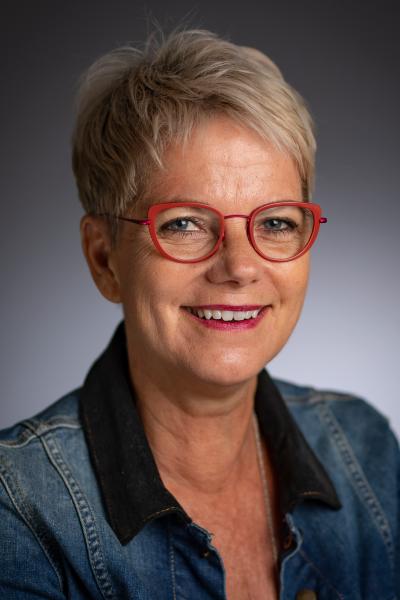Maritha Jacobsson
Senior Lecturer/Associate Professor at Institutionen för socialt arbete; Lärare och forskare
- Telephone:
- +46 18 471 51 86
- E-mail:
- maritha.jacobsson@uu.se
- Visiting address:
- Engelska parken
Thunbergsvägen 3H - Postal address:
- Box 624
751 26 UPPSALA
- Academic merits:
- FD, Docent
More information is available to staff who log in.
Short presentation
This text is not available in English, therefore the Swedish version is shown.
Maritha Jacobsson disputerade 2006 vid institutionen för socialt arbete, Umeå universitet. Efter det arbetade hon som projektledare, 2009 blev hon anställd som universitetslektor och 2013 utnämndes hon som docent i socialt arbete vid institutionen för socialt arbete, Umeå universitet. I september 2019 blev Jacobsson anställd som universitetslektor vid centrum för socialt arbete (CESAR), sociologiska institutionen, Uppsala universitet.
Research
This text is not available in English, therefore the Swedish version is shown.
The aim with my dissertation ”The Therapist’s Rights. Judicial and therapeutic logic in court hearings” (Terapeutens rätt. Rättslig och terapeutisk logik i domstolsförhandlingar) was to study the tension between judicial and therapeutic logic related to compulsory care (LVU, LVM, LPT). My research interest has after that revolved around sociology of law; court hearings in relation to compulsory care, victim offender mediation, domestic violence and how the court value credibility in rape cases.
Since 2006 I have been involved in the following projects:
- Is the victim better off? A study of victim offender mediation in Sweden (Till nytta för brottsoffret? En studie av medlingssamtal och dess ställning i rättsystemet. (Brottsofferfonden 2008-2010)
- Are female rape victims discriminated in legal proceedings? Credibility of male and female crime victims (Diskriminerar rättssystemet kvinnliga våldtäktsoffer? Trovärdighet hos kvinnliga och manliga brottsoffer). This project is funded by the Swedish Crime Victim Compensation and Support Authority (Brottsoffermyndigheten 2011-2014).
- Swedish mediation methods for young persons: intent and practice (Svenska medlingsmetoder för unga: intention och praktik) This project was funded by Stiftelsen Allmänna Barnhuset (2015-2016)
I am currently responsible for the following projects:
- Domestic violence. Characteristic patterns of vulnerability (Våld i nära relation. Karaktäristiska mönster av utsatthet i ett livs- och befolkningsperspektiv). This project is funded by the Swedish Crime Victim Compensation and Support Authority (Brottsoffermyndigheten 2015-2019). Coworker: Associate professor Tommy Andersson and doctoral student Rickard Pettersson.
- The relation between perception and attribution of guilt in court hearings – comparing rape, assault and robbery (Relationen mellan skuldupplevelse och skuldbeläggande i domstolsförhandlingar - en jämförande studie av våldtäkt, misshandel och personrån). Coworker: Professor Stefan Sjöström. This project is funded by Swedish Research Council for Health, Working Life and Welfare (Forte 2018-2021). In this project the aim is to investigate the relation between crime victims’ perception of guilt and discursive practices that might attribute guilt in court hearings. To capture variation in cultural contexts and understandings of crime events, we apply a comparative approach including three types of crime: rape, assault and robbery against a person. Specifically, the following empirical questions will guide the analysis:
-
- 1. Do crime victims perceive that they are attributed with guilt during court hearings?
- 2. Do crime victims perceive that they are attributed with guilt during the preceding police investigation and by their social environment?
- 3. Do professionals in court perceive that guilt-attributing discursive practices occur during court hearings?
- 4. Can guilt-attributing discursive practices be observed in court hearings?
- 5. Do professionals in court apply conscious strategies to address the risk of attributing guilt to crime victims? These questions are analyzed by comparing interviews with crime victims and professional participants with video-recorded interrogations from court hearings in which the interviewees have participated. The results can contribute to assess the scope of the problem with victim-blaming in court hearings. They can also be used to develop professional practice to reduce the risk for victim-blaming.
Publications
Recent publications
- Can equity in care be achieved for stigmatized patients? (2024)
- Samarbetssamtal vid oenighet om barn (2023)
- Challenges in preserving the “good doctor” norm (2023)
- Experience of guilt in court hearings (2023)
- Målsägandens oro inför rättegångsprocessen (2023)
All publications
Articles
- Can equity in care be achieved for stigmatized patients? (2024)
- Challenges in preserving the “good doctor” norm (2023)
- Experience of guilt in court hearings (2023)
- Målsägandens oro inför rättegångsprocessen (2023)
- Så ska du inte bemöta en våldsam man som anhörig (2023)
- Organizational logics in time of crises (2022)
- Akademisering av examensmålet våld i nära relation i socialt arbete (2021)
- Women and men sexually violated by closely related perpetrators over a lifespan (2020)
- Classroom bodies (2020)
- Humanjuridik (2018)
- Collegiality, therapy and mediation (2017)
- Kunskap och kommunikation är en ledares plattform (2016)
- Trauma team leaders' non-verbal communication (2016)
- Offer, minne, och utsatthet (2016)
- Touch massage, a rewarding experience (2014)
- Communication in interdisciplinary teams (2013)
- Flexible knowledge repertoires (2012)
- Victim - offender meidation in Sweden (2012)
- Defender, spokesperson, therapist (2007)
- Law and Society. Scandinavian Studies in Law (2007)
- Terapeuten som motpart (2007)
- Terapeuten som motpart (2007)
- Tveksamhet kring tvång (2006)
- Kollegialitet, terapi och medling (2003)
- Röster i rätten (2000)
Books
Chapters
- Samarbetssamtal vid oenighet om barn (2023)
- Medling vid brott (2023)
- Victim offender mediation in Sweden (2018)
- Barnrätten som kunskapsregim och social praktik (2012)
- Klienter som inte vet sitt bästa – om terapeutiska bedömningar i rättslig kontext (2009)
- Terapeutiska bedömningar i rättslig kontext (2009)
- En ritual som ger tyngd (2006)
Conferences
- Children and Child Law at Crossroads (2013)
- Believing and blamning the victim (2012)
- Trovärdighet i våldtäktsmål (2010)
- Till nytta för brottsoffret? (2010)
- The development of victim offender mediation in Sweden (2010)
Reports
- Medling vid brott (2017)
- Två psykiatrinätverk för evidensbaserad kunskapsanvändning - tidigt omhändertagande vid psykos och ADHD/autismspektrumtillstånd (2008)
- Samverkan och kunskapsstyrning genom tre psykiatrinätverk (2008)
- Konflilkten som inte blir av - argumentation och kommunikation i LVM-förhandlingar (2004)
Other

